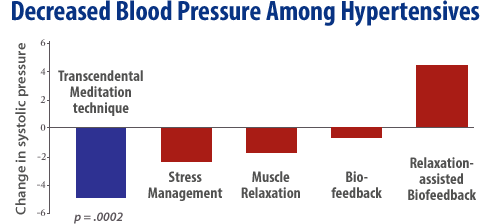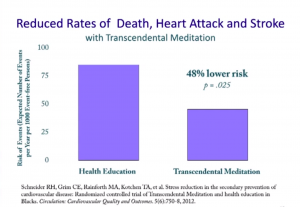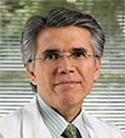The National Institutes of Health has granted over $20 million to study the effects of TM practice in preventing and treating heart disease, high blood pressure, and stroke.
Published research shows the TM technique helps:
Reduce high blood pressure
NIH-Funded Research on Blood Pressure and Heart Health
The National Institutes of Health has granted more than $24 million over the past 18 years to study the effects of the Transcendental Meditation (TM) technique on cardiovascular health. The following is a summary of findings of the published research as well as a listing of universities where recent studies have been conducted.
Reduced Heart Attack, Stroke and Death in Heart Patients(American Heart Association’s Circulation, November 2012)
The randomized, controlled study of 201 male and female patients with heart disease found that those who regularly practiced the Transcendental Meditation technique were 48 percent less likely to have a heart attack, stroke, or die from all causes compared with patients who attended a health education class over more than five years. Those practicing the TM technique also lowered their blood pressure and reported less stress and anger. And the more regularly patients meditated, the greater their survival, as reported by the researchers who conducted the study at the Medical College of Wisconsin.
Reduced Blood Pressure (Current Hypertension Reports, December 2007)
This meta-analysis of 17 published studies from the medical literature (selected from over 100 published studies for their careful experimental design utilizing randomized controlled trials) reported on the effects of stress reduction techniques on elevated blood pressure in about 1000 subjects total. The treatments employed included simple biofeedback, relaxation-assisted biofeedback, progressive muscle relaxation, stress management training, and the Transcendental Meditation technique. The results of statistical analyses showed that none of the first 4 treatment approaches demonstrated statistically significant reductions in elevated blood pressure, while the TM technique showed both significant clinical and statistical reductions in blood pressure.
Improved Quality of Life for Congestive Heart Failure Patients(Ethnicity and Disease, March 2007)
This study examined the effects of conventional health education and the practice of the Transcendental Meditation technique on measures of heart failure severity and quality of life in a randomized controlled trial of twenty-three older African American men and women with congestive heart failure (CHF). The results indicate that the use of the TM technique may be effective in improving the quality of life and functional capacity of heart failure patients.
Reduced Blood Pressure and Improved Insulin Resistance(American Medical Association’s Archives of Internal Medicine, June 2006)
This 16-week, randomized, placebo-controlled clinical trial of 103 coronary heart patients found that the Transcendental Meditation technique improved blood pressure and insulin resistance components of the metabolic syndrome as well as cardiac autonomic nervous system tone compared with a control group receiving health education. These results suggest that the TM technique may modulate the physiological response to stress and improve coronary heart disease risk factors.
Enhanced Longevity (American Journal of Cardiology, May 2005)
This study was a first-of-its-kind, long-term, randomized trial. It evaluated the death rates of 202 men and women, average age 71, who had mildly elevated blood pressure. Subjects in the study participated in the Transcendental Meditation technique; behavioral techniques, such as mindfulness or progressive muscle relaxation; or health education. The study tracked subjects for up to 18 years. The study found that the TM technique reduced death rates by 23%.
Reduced Blood Pressure and Use of Hypertensive Medication(American Journal of Hypertension, January 2005)
This long-term, clinical trial evaluated 150 men and women, average age 49, with stage I hypertension (average blood pressure 142/95 mm Hg). Blood pressure in the Transcendental Meditation group reduced by nearly 6 mm diastolic pressure and by 3 mm systolic pressure. In contrast, blood pressure in the progressive muscle relaxation group and conventional health education classes reduced by 3 mm diastolic pressure, with no change in systolic pressure. Use of hypertensive medication was also found to significantly decrease in the TM group in comparison with controls.
Reduced Blood Pressure in At-risk Teens (American Journal of Hypertension, April, 2004)
This $1.5 million, four-year, randomized, controlled study found that adolescents at risk for heart disease experienced decreased blood pressure as a result of the daily Transcendental Meditation practice.
Reduce atherosclerosis
Reduced Atherosclerosis (American Journal of Cardiology, April 2002)
This study found that subjects with multiple risk factors for cardiovascular disease substantially reduced atherosclerosis through a multi-modality treatment program derived from a system of traditional medicine that included the daily practice of the Transcendental Meditation technique. In the study, 57 adults were randomly assigned into three treatment groups. After one year, the ceratoid intima-media thickness decreased significantly more in the subjects who were randomly assigned to the TM group.
Regression of Atherosclerosis (Stroke, March 2000)
A well-designed, randomized, controlled clinical trial found that the daily practice of the Transcendental Meditation technique was associated with or reduced narrowing of the arteries in the heart and brain in high-risk hypertensive adults, thereby decreasing the risk of heart attack and stroke. After six to nine months, carotid artery wall thickness decreased in the TM group compared to matched control subjects. This regression was similar to that achieved by some lipid-lowering drugs and extensive lifestyle changes.
Reduce constriction of blood vessels
Reduced Heart Attack, Stroke and Death in Heart Patients (American Heart Association’s Circulation, November 2012)
The randomized, controlled study of 201 male and female patients with heart disease found that those who regularly practiced the Transcendental Meditation technique were 48 percent less likely to have a heart attack, stroke, or die from all causes compared with patients who attended a health education class over more than five years. Those practicing the TM technique also lowered their blood pressure and reported less stress and anger. And the more regularly patients meditated, the greater their survival, as reported by the researchers who conducted the study at the Medical College of Wisconsin.
Reduced Blood Pressure (Current Hypertension Reports, December 2007)
This meta-analysis of 17 published studies from the medical literature (selected from over 100 published studies for their careful experimental design utilizing randomized controlled trials) reported on the effects of stress reduction techniques on elevated blood pressure in about 1000 subjects total. The treatments employed included simple biofeedback, relaxation-assisted biofeedback, progressive muscle relaxation, stress management training, and the Transcendental Meditation technique. The results of statistical analyses showed that none of the first 4 treatment approaches demonstrated statistically significant reductions in elevated blood pressure, while the TM technique showed both significant clinical and statistical reductions in blood pressure.
Improved Quality of Life for Congestive Heart Failure Patients (Ethnicity and Disease, March 2007)
This study examined the effects of conventional health education and the practice of the Transcendental Meditation technique on measures of heart failure severity and quality of life in a randomized controlled trial of twenty-three older African American men and women with congestive heart failure (CHF). The results indicate that the use of the TM technique may be effective in improving the quality of life and functional capacity of heart failure patients.
Reduced Blood Pressure and Improved Insulin Resistance(American Medical Association’s Archives of Internal Medicine, June 2006)
This 16-week, randomized, placebo-controlled clinical trial of 103 coronary heart patients found that the Transcendental Meditation technique improved blood pressure and insulin resistance components of the metabolic syndrome as well as cardiac autonomic nervous system tone compared with a control group receiving health education. These results suggest that the TM technique may modulate the physiological response to stress and improve coronary heart disease risk factors.
Reduced thickening of coronary arteries
Reduced Heart Attack, Stroke and Death in Heart Patients (American Heart Association’s Circulation, November 2012)
The randomized, controlled study of 201 male and female patients with heart disease found that those who regularly practiced the Transcendental Meditation technique were 48 percent less likely to have a heart attack, stroke, or die from all causes compared with patients who attended a health education class over more than five years. Those practicing the TM technique also lowered their blood pressure and reported less stress and anger. And the more regularly patients meditated, the greater their survival, as reported by the researchers who conducted the study at the Medical College of Wisconsin.
Reduced Blood Pressure (Current Hypertension Reports, December 2007)
This meta-analysis of 17 published studies from the medical literature (selected from over 100 published studies for their careful experimental design utilizing randomized controlled trials) reported on the effects of stress reduction techniques on elevated blood pressure in about 1000 subjects total. The treatments employed included simple biofeedback, relaxation-assisted biofeedback, progressive muscle relaxation, stress management training, and the Transcendental Meditation technique. The results of statistical analyses showed that none of the first 4 treatment approaches demonstrated statistically significant reductions in elevated blood pressure, while the TM technique showed both significant clinical and statistical reductions in blood pressure.
Improved Quality of Life for Congestive Heart Failure Patients (Ethnicity and Disease, March 2007)
This study examined the effects of conventional health education and the practice of the Transcendental Meditation technique on measures of heart failure severity and quality of life in a randomized controlled trial of twenty-three older African American men and women with congestive heart failure (CHF). The results indicate that the use of the TM technique may be effective in improving the quality of life and functional capacity of heart failure patients.
Reduced Blood Pressure and Improved Insulin Resistance(American Medical Association’s Archives of Internal Medicine, June 2006)
This 16-week, randomized, placebo-controlled clinical trial of 103 coronary heart patients found that the Transcendental Meditation technique improved blood pressure and insulin resistance components of the metabolic syndrome as well as cardiac autonomic nervous system tone compared with a control group receiving health education. These results suggest that the TM technique may modulate the physiological response to stress and improve coronary heart disease risk factors.
Enhanced Longevity (American Journal of Cardiology, May 2005)
This study was a first-of-its-kind, long-term, randomized trial. It evaluated the death rates of 202 men and women, average age 71, who had mildly elevated blood pressure. Subjects in the study participated in the Transcendental Meditation technique; behavioral techniques, such as mindfulness or progressive muscle relaxation; or health education. The study tracked subjects for up to 18 years. The study found that the TM technique reduced death rates by 23%.
Reduce use of anti hypertensive medication
Reduced Blood Pressure and Use of Hypertensive Medication (American Journal of Hypertension, January 2005)
This long-term, clinical trial evaluated 150 men and women, average age 49, with stage I hypertension (average blood pressure 142/95 mm Hg). Blood pressure in the Transcendental Meditation group reduced by nearly 6 mm diastolic pressure and by 3 mm systolic pressure. In contrast, blood pressure in the progressive muscle relaxation group and conventional health education classes reduced by 3 mm diastolic pressure, with no change in systolic pressure. Use of hypertensive medication was also found to significantly decrease in the TM group in comparison with controls.
(Americ
Reduced mortality rates due to heart disease
Reduced Heart Attack, Stroke and Death in Heart Patients (American Heart Association’s Circulation, November 2012)
The randomized, controlled study of 201 male and female patients with heart disease found that those who regularly practiced the Transcendental Meditation technique were 48 percent less likely to have a heart attack, stroke, or die from all causes compared with patients who attended a health education class over more than five years. Those practicing the TM technique also lowered their blood pressure and reported less stress and anger. And the more regularly patients meditated, the greater their survival, as reported by the researchers who conducted the study at the Medical College of Wisconsin.

RESEARCH FUNDED, PUBLISHED, OR PRESENTED BY:

This meta-analysis was conducted on all published studies on stress reduction and blood pressure among hypertensive patients which met the criteria of well-designed randomized control trials with multiple studies for each treatment category. Only the Transcendental Meditation technique was found to have a statistically significant impact of reducing high blood pressure among hypertensive subjects. A second meta-analysis conducted independently replicated the finding of significantly reduced blood pressure, both systolic and diastolic, through the TM technique.
Reference:
1. Current Hypertension Reports: 9 (2007): 520–528.
2. American Journal of Hypertension: 21 (2008): 310–316.






 “The Transcendental Meditation technique, even though it is a mental technique, brings about a unique neurophysiological state. Those changes in the physiology lead to a drop in cholesterol and a drop in blood pressure. When you lower your blood pressure and your cholesterol, you decrease your risk of atherosclerosis. Studies have shown that patients with coronary heart disease who practice the Transcendental Meditation technique have less angina. I believe that there’s no better medicine than TM.”
“The Transcendental Meditation technique, even though it is a mental technique, brings about a unique neurophysiological state. Those changes in the physiology lead to a drop in cholesterol and a drop in blood pressure. When you lower your blood pressure and your cholesterol, you decrease your risk of atherosclerosis. Studies have shown that patients with coronary heart disease who practice the Transcendental Meditation technique have less angina. I believe that there’s no better medicine than TM.”